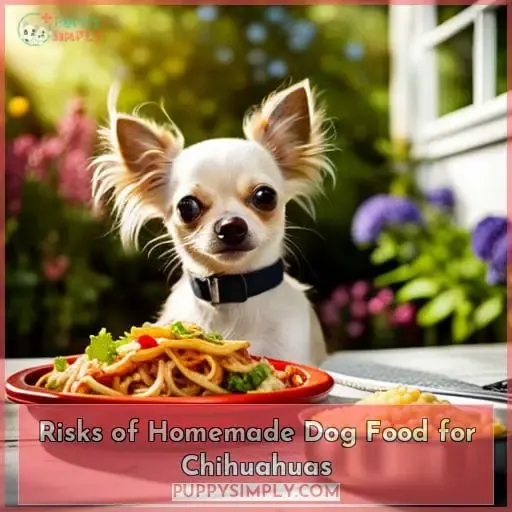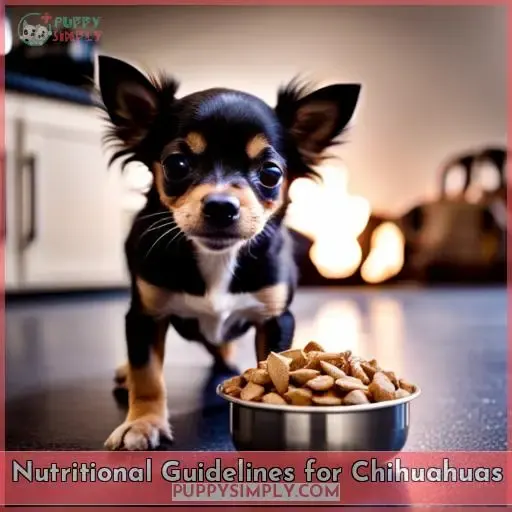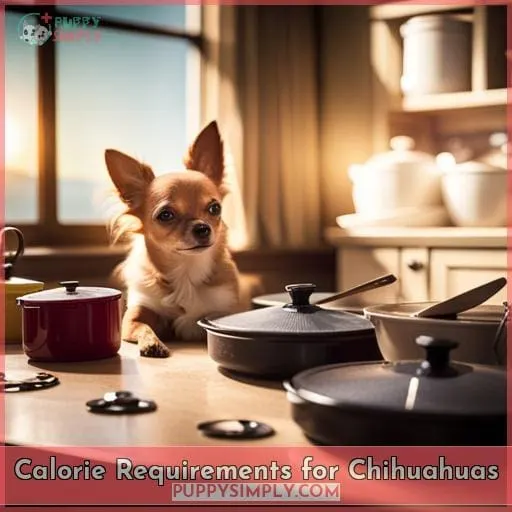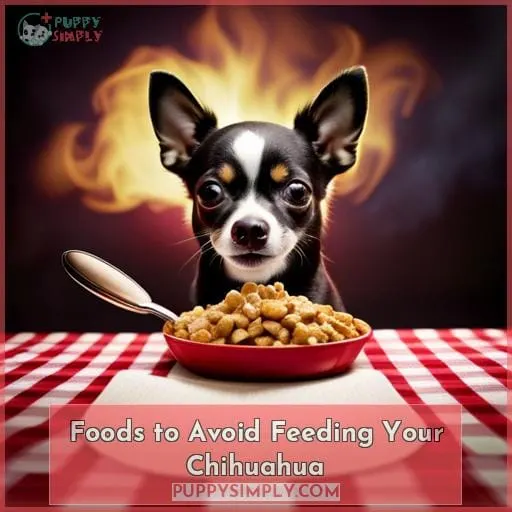This site is supported by our readers. We may earn a commission, at no cost to you, if you purchase through links.
 Imagine being able to provide your beloved Chihuahua with homemade dog food that not only satisfies their taste buds but also nourishes them from the inside out. With chihuahua homemade dog food, you have the power to take control of your pup’s diet and ensure they receive all the essential nutrients they need.
Imagine being able to provide your beloved Chihuahua with homemade dog food that not only satisfies their taste buds but also nourishes them from the inside out. With chihuahua homemade dog food, you have the power to take control of your pup’s diet and ensure they receive all the essential nutrients they need.
Discover the nutritional benefits and potential risks of feeding your Chihuahua homemade meals, as well as recommended supplements to keep them healthy and happy for years to come.
Table Of Contents
- Key Takeaways
- Benefits of Homemade Dog Food for Chihuahuas
- Risks of Homemade Dog Food for Chihuahuas
- Nutritional Guidelines for Chihuahuas
- Dietary Changes in Chihuahuas and Their Health Implications
- Calorie Requirements for Chihuahuas
- Homemade Dog Food for Chihuahua Puppies
- Homemade Dog Food Delivery Service
- Safe Dog Cooking Practices
- Foods to Avoid Feeding Your Chihuahua
- Frequently Asked Questions (FAQs)
- Can I substitute any ingredients in the homemade dog food recipe for Chihuahuas?
- How do I calculate the appropriate portion size of homemade dog food for my Chihuahua?
- Are there any specific dietary considerations for Chihuahua puppies when feeding them homemade dog food?
- Can I add supplements to homemade dog food for Chihuahuas?
- Are there any specific health conditions or allergies that I should consider when making homemade dog food for my Chihuahua?
- Conclusion
Key Takeaways
- Homemade dog food for Chihuahuas allows control over ingredients and portion sizes, promoting a healthier diet without chemicals.
- However, there are risks involved, such as not understanding their nutritional needs and using inadequate or dangerous recipes that can lead to unbalanced meals or the inclusion of unsafe ingredients.
- It is important to consult with a veterinarian and consider recommended supplements for Chihuahuas, such as multivitamins, cardiac support, joint health support, immune function support, and digestive health support.
- Nutritional guidelines for Chihuahuas include providing adequate protein, carbohydrates, healthy fats, minerals, and hydration, which can have implications on their coat color, gastrointestinal health, coat condition, and overall skin health.
Benefits of Homemade Dog Food for Chihuahuas
Homemade dog food offers several nutritional benefits for Chihuahuas.
By preparing your own meals, you have control over the ingredients and can ensure that your dog receives a healthier diet with no added chemicals.
Additionally, homemade food allows for portion size control and the use of fresh ingredients, which can contribute to better overall health in Chihuahuas.
Nutritional benefits of homemade dog food.
When preparing homemade dog food for your Chihuahua, you can ensure that they’re receiving the nutritional benefits of fresh ingredients.
Homemade dog food allows you to have control over what goes into your pet’s diet and tailor it to their specific needs.
By using high-quality ingredients and following balanced recipes, you can provide essential nutrients like protein, carbohydrates, fats, minerals, vitamins, and water.
Additional Information:
- Homemade dog food for puppies should be formulated with higher levels of protein,
fat,
calcium,
and phosphorus compared to adult dogs.
- It’s important to consult with a veterinarian or canine nutritionist before making any changes to your chihuahua’s diet.
Risks of homemade dog food.
While there are many benefits to feeding homemade dog food to your Chihuahua, it’s important to be aware of the potential risks as well.
- Not understanding nutritional needs
- Using inadequate or dangerous recipes
- Not preparing a balanced meal
- Using unsafe or harmful ingredients
It’s crucial to educate yourself about proper nutrition for your Chihuahua and consult with a veterinarian or canine nutritionist before making any dietary changes. Safety and health should always be prioritized when preparing homemade dog food for your furry friend.
Recommended supplements for chihuahuas
To ensure your Chihuahua receives all the necessary nutrients, consider incorporating recommended supplements into their homemade dog food.
Supplements like Zesty Paws Dog Multivitamin and Cardiac Support Supplement for Pets can provide additional support for joint health, immune function, digestion, and overall wellness.
It’s important to follow the recommended dosage and frequency of administration to avoid any potential side effects or interactions with other medications.
These supplements have shown efficacy in supporting chihuahuas’ health when used appropriately alongside a balanced homemade diet.
Risks of Homemade Dog Food for Chihuahuas
Although there are many benefits to feeding your Chihuahua homemade dog food, it’s important to be aware of the potential risks involved.
- Not understanding nutritional needs: Chihuahuas have specific dietary requirements that need to be met in order for them to thrive. Without a proper understanding of their nutritional needs, you may unintentionally provide an imbalanced diet that lacks essential nutrients.
- Inadequate or dangerous recipes: Using recipes that haven’t been properly researched or formulated can lead to serious health issues for your Chihuahua. Certain ingredients and cooking methods can be harmful or even toxic.
- Not preparing a balanced meal: A balanced meal is crucial for your Chihuahua’s overall health and well-being. Failure to include all necessary nutrients in appropriate proportions can result in deficiencies or excesses which could lead to various health problems.
It is imperative that you educate yourself on the proper nutrition requirements of chihuahuas before embarking on preparing homemade meals for them.
Nutritional Guidelines for Chihuahuas
When it comes to the nutritional guidelines for Chihuahuas, there are several key factors to consider:
- Protein is essential for muscle development and overall growth in dogs.
- Carbohydrates provide energy.
- Fat is necessary for healthy skin and coat, as well as proper brain function.
- Minerals play a vital role in various bodily functions.
- Water is crucial for hydration.
- Vitamins support overall health and immunity.
Understanding these nutritional components will help you create a balanced homemade diet that meets your Chihuahua’s specific needs.
Protein
Make sure to include a good source of protein in your homemade dog food for Chihuahuas.
Chicken, eggs, and brown rice are excellent sources of protein that can help support your Chihuahua’s overall health and wellbeing.
Protein is essential for muscle development, immune function, and energy production.
Aim to include about 1/4 cup of protein-rich ingredients like chicken or egg per every 10 pounds of body weight in your homemade dog food recipe to ensure adequate protein intake for your furry friend.
Carbohydrates
Include carbohydrates as a vital component in your Chihuahua’s homemade dog food to provide essential energy and dietary fiber.
When choosing carbohydrates for your furry friend, opt for complex carbs like brown rice and whole grains rather than simple carbs like white rice or refined flour.
Complex carbs are digested more slowly, providing sustained energy throughout the day. Additionally, they contain higher amounts of fiber which aids digestion and promotes a healthy gastrointestinal system for your Chihuahua.
Fat
To ensure a balanced diet for your Chihuahua, it’s important to incorporate an adequate amount of fat into their homemade dog food on a regular basis. However, it’s crucial to be mindful of the type and quantity of fats you include in their diet.
High-fat diets can lead to weight gain and increase the risk of pancreatitis in Chihuahuas. It’s essential to focus on healthy fats like omega-3s while limiting bad fats such as saturated fats for optimal nutritional balance.
Minerals
To ensure your Chihuahua’s overall health and well-being, it’s important to provide them with the necessary minerals in their homemade dog food.
Minerals such as calcium, phosphorus, iron, zinc, and selenium play vital roles in maintaining bone strength, muscle function,and immune system support.
Including a variety of mineral-rich ingredients like dairy products (for calcium), lean meats (for iron), whole grains (for phosphorus), and legumes (for zinc) can help meet your Chihuahua’s mineral needs while following a balanced chihuahua food chart for homemade dog food.
Water
Chihuahuas require an adequate intake of water to maintain their overall health and well-being. It’s important to ensure that your Chihuahua has access to clean, fresh water at all times.
The amount of water needed depends on factors such as age, activity level, and environmental conditions. As a general guideline, provide your Chihuahua with about 1 ounce of water per pound of body weight daily.
Be sure to monitor their hydration levels and adjust the frequency of water accordingly during hot weather or increased physical activity.
Vitamins
What vitamins are essential for your Chihuahua’s nutritional needs?
Vitamins play a crucial role in maintaining the health and well-being of your Chihuahua.
- Vitamin A: Essential for healthy vision, immune function, and growth.
- Vitamin C: Supports collagen production, boosts immunity, and acts as an antioxidant.
- Vitamin D: Important for bone health and calcium absorption.
Including these vitamins in your Chihuahua’s homemade dog food recipes can help ensure they receive the necessary nutrients to thrive.
Dietary Changes in Chihuahuas and Their Health Implications
When it comes to dietary changes in Chihuahuas, there are several health implications that you need to be aware of.
These include:
- Coat color changes
- Concurrent GI signs
- Chronic itching and dermatitis
- Dull coat and scaling
- Dandruff and crustiness
Understanding these potential health issues can help you make informed decisions about your Chihuahua’s diet and ensure their overall well-being.
Coat Color Changes
If you notice changes in your Chihuahua’s coat color, it may be a sign that dietary changes are needed to address potential health implications.
Coat color changes can occur due to various reasons such as:
- Concurrent GI signs
- Chronic itching and dermatitis
- Dull coat and scaling
- Dandruff and crustiness
These symptoms could indicate underlying nutritional deficiencies or allergies.
Consulting with a veterinarian or canine nutritionist can help identify the specific dietary adjustments necessary for your Chihuahua’s optimal health.
Concurrent GI Signs
If your Chihuahua experiences concurrent GI signs, such as vomiting or diarrhea, dietary changes may play a significant role in their overall health and well-being.
Here are three potential implications of dietary changes on your Chihuahua’s health:
- Weight Loss: Persistent diarrhea or vomiting can lead to weight loss if not properly managed.
- Lethargy: Gastrointestinal issues can cause lethargy and decreased energy levels.
- Dehydration: Frequent bouts of diarrhea and vomiting may result in dehydration if fluid intake isn’t maintained.
It is crucial to monitor these symptoms closely and consult with a veterinarian for proper diagnosis and treatment options for your Chihuahua’s gastrointestinal health concerns.
Chronic Itching and Dermatitis
If your Chihuahua is experiencing chronic itching and dermatitis, dietary changes can play a crucial role in improving their health.
Itching and scratching, redness and inflammation, hair loss and bald spots are common symptoms of skin issues in dogs.
By adjusting your Chihuahua’s diet to include ingredients that promote healthy skin such as omega-3 fatty acids found in fish oil or flaxseed oil, you may help alleviate these uncomfortable conditions.
| Symptoms | Dietary Recommendations |
|---|---|
| Itching and Scratching | Increase Omega-3 Fatty Acids (Fish Oil/Flaxseed Oil) |
| Redness and Inflammation | Avoid Allergenic Ingredients (Grains/Dairy) |
| Hair Loss/Bald Spots | Include Protein-Rich Foods (Chicken/Beef/Fish) |
Dull Coat and Scaling
Improving your Chihuahua’s dull coat and scaling can be achieved through dietary changes.
Ensuring nutritional balance is crucial for maintaining a healthy skin and coat.
Homemade recipes can provide the necessary nutrients to address these issues.
By making appropriate dietary changes, you can enhance your dog’s overall health and appearance.
Consider adjusting calorie requirements based on their age, size, and activity level to support optimal puppy nutrition as well.
Dandruff and Crustiness
To address the issue of dandruff and crustiness in your Chihuahua, consider making dietary changes that can improve their skin health.
Adjusting their diet to include essential nutrients like omega-3 fatty acids and antioxidants can promote healthier skin and reduce dandruff.
Additionally, ensuring they’re receiving adequate hydration is crucial for maintaining a hydrated coat.
Consult with your veterinarian or a canine nutritionist to create a homemade recipe that meets their specific nutritional guidelines and calorie requirements for optimal skin health.
Calorie Requirements for Chihuahuas
Now that we’ve discussed the dietary changes in Chihuahuas and their health implications, let’s delve into an equally important aspect of their nutrition: calorie requirements.
Calorie intake plays a crucial role in maintaining your Chihuahua’s overall health and well-being. For adult Chihuahuas, the recommended daily calorie range is between 139-234 calories. However, it’s essential to note that puppies have different nutritional needs than adults or seniors.
Chihuahua puppies require higher levels of protein, fat, calcium, and phosphorus compared to adult dogs. As such, homemade dog food recipes for puppies should be formulated with these specific nutritional guidelines in mind.
If you’re considering preparing homemade meals for your furry friend but find yourself short on time or unsure about meeting all their dietary needs accurately,Homemade Dog Food Delivery Services like The Farmer’s Dog can help provide tailored meals based on your dog’s unique age-specific requirements while adhering to AAFCO nutritional guidelines.
By understanding the proper calorie requirements for your Chihuahua at different life stages and utilizing reputable resources like homemade dog food services when needed,you can ensure that they receive optimal nutrition throughout their lives without compromising taste or quality.
Homemade Dog Food for Chihuahua Puppies
Start feeding your Chihuahua puppy homemade dog food that’s specifically tailored to their higher protein, fat, calcium, and phosphorus needs.
Puppy nutrition is crucial for their growth and development. Meal planning plays a key role in ensuring they receive the necessary nutrients for optimal health. Homemade recipes allow you to have control over the ingredients used and avoid harmful additives or chemicals found in commercial foods.
However, it’s important to carefully plan meals to ensure a balanced diet that meets all of your Chihuahua puppy’s nutritional requirements.
As puppies have different dietary needs than adult dogs, consult with your veterinarian or a canine nutritionist when transitioning them from commercial food to homemade recipes.
Homemade Dog Food Delivery Service
If you’re looking for a convenient and hassle-free way to provide homemade dog food for your Chihuahua, consider trying a homemade dog food delivery service.
These services offer tailored, fresh meals that are developed by veterinary nutritionists according to AAFCO guidelines.
They save you time and eliminate the need for meal planning, grocery shopping, and cooking.
By opting for a homemade dog food delivery service, you can ensure that your Chihuahua is getting high-quality nutrition without any added chemicals or preservatives.
Additionally, these services often offer customizable options based on your dog’s unique dietary needs and health conditions.
It’s important to consult with your veterinarian or canine nutritionist before making any dietary changes or incorporating nutritional supplements into your Chihuahua’s diet.
Safe Dog Cooking Practices
To ensure the safety of your furry friend, it’s important to follow safe dog cooking practices when preparing homemade meals.
- Practice proper hygiene:
- Wash your hands thoroughly before and after handling raw ingredients, such as meat and vegetables, to prevent the spread of bacteria.
- Additionally, clean all utensils and surfaces that come into contact with these ingredients.
- Cook food thoroughly:
- Ensure that all meat is cooked properly to kill any harmful bacteria or parasites that may be present.
- Use a food thermometer to check for an internal temperature of at least 165°F (74°C) for poultry and ground meat.
- Store leftovers correctly:
- Refrigerate any leftover homemade dog food promptly in an airtight container for up to five days or freeze them for longer storage periods.
Following these safe cooking practices will help safeguard your Chihuahua’s health while enjoying nutritious homemade meals tailored specifically for their nutritional needs.
Foods to Avoid Feeding Your Chihuahua
To ensure the health and safety of your Chihuahua, it’s important to be aware of foods that shouldn’t be fed to them.
Feeding your Chihuahua homemade dog food comes with its own set of risks if you’re not careful about what ingredients you use.
- Onions
- Garlic
- Chocolate
- Raisins
- Grapes
- Kale
- Cooked bones
- Soy sauce
- Avocado
These items should never be included in homemade dog food recipes for Chihuahuas as they can cause various health issues such as gastrointestinal problems and even organ failure. It’s crucial to understand the impact of dietary changes on your dog’s well-being and avoid using unsafe or harmful ingredients in their meals.
By being mindful of these potential risks associated with certain foods for Chihuahuas when preparing homemade meals for them, you’ll help keep your furry friend safe and healthy.
Frequently Asked Questions (FAQs)
Can I substitute any ingredients in the homemade dog food recipe for Chihuahuas?
Yes, you can substitute ingredients in the homemade dog food recipe for Chihuahuas. However, it’s important to consult with a veterinarian or canine nutritionist to ensure you’re making appropriate substitutions that meet your dog’s nutritional needs.
How do I calculate the appropriate portion size of homemade dog food for my Chihuahua?
To calculate the appropriate portion size of homemade dog food for your Chihuahua, use the guideline of 1/4 cup for every 10 pounds of body weight.
Serve 2 servings per day.
Adjust portions based on weight, activity level, and health condition changes.
Are there any specific dietary considerations for Chihuahua puppies when feeding them homemade dog food?
When feeding homemade dog food to Chihuahua puppies, it’s important to consider their higher protein, fat, calcium, and phosphorus needs.
Feed them 2-3 meals daily at scheduled intervals and consult with a veterinarian for tailored advice.
Can I add supplements to homemade dog food for Chihuahuas?
Yes, you can add supplements to homemade dog food for Chihuahuas.
Consider using options like:
- Zesty Paws Dog Multivitamin Supplement
- Cardiac Support Supplement for Pets
to support overall health and heart function.
Are there any specific health conditions or allergies that I should consider when making homemade dog food for my Chihuahua?
Consider your Chihuahua’s health conditions and allergies when making homemade dog food.
Consult with a veterinarian or canine nutritionist to ensure the recipe meets their specific needs, promoting optimal well-being and minimizing potential risks.
Conclusion
To provide your beloved Chihuahua with homemade dog food is to give them a nourishing and flavorful diet tailored specifically to their needs.
The nutritional benefits of chihuahua homemade dog food are numerous, providing essential nutrients for their overall health. However, there are also risks involved, such as the potential for an imbalanced diet.
To mitigate these risks, it’s recommended to incorporate supplements into their homemade meals.
By taking control of your pup’s diet, you can ensure they thrive and live a happy, healthy life.















